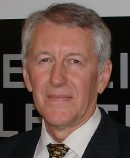
Keynote Lecture
Iterative UFIR Filtering of Linear and Nonlinear Models on Optimal Horizons

Professor Yuriy S. Shmaliy (IEEE Fellow)
Department of Electronics Engineering
DICIS, Universidad de Guanajuato
Salamanca, Mexico
E-mail: shmaliy@ugto.mx
Abstract: Recursive Kalman filtering widely used in state estimation of linear time-varying and time-invariant discrete state-space models often faces a problem of unknown noise and initial conditions. The problem complicates if the model and noise covariance matrices are all time-variant. Under the unknown noise statistics and initial error statistics, the Kalman filter can produce large and even unacceptable errors. In this lecture, we show that recently designed the iterative unbiased finite impulse response (UFIR) filter is able to overcome these disadvantages. The UFIR filter completely ignores the noise statistics while providing good estimates on a horizon of optimal Nopt points. We discuss several most common UFIR filtering algorithms associated with fixed-horizon and full-horizon filtering of linear and nonlinear models. In the latter case, we employ the first-order extended UFIR solution called the EFIR filter. A distinctive property of UFIR filtering is that its unbiased estimate converges to optimal in the minimum mean square (MSE) sense by increasing the averaging horizon N. Moreover, if the state model is deterministic, then the white noise variance is reduced by the factor of N which optimal value lies at infinity. Another specific is that the controlled nonlinear models often require full-horizons because the EFIR filter matches such models over a very long baseline. Under such conditions, the UFIR and EFIR filters typically outperform the Kalman filter. Examples are given for tracking, state estimation, and indoor mobile robot localization.
Brief Biography of the Speaker: Dr. Yuriy S. Shmaliy is a full professor in Electrical Engineering of the Universidad de Guanajuato, Mexico, since 1999. He received the B.S., M.S., and Ph.D. degrees in 1974, 1976 and 1982, respectively, from the Kharkiv Aviation Institute, Ukraine. In 1992 he received the Dr.Sc. (technical) degree from the Soviet Union Government. In March 1985, he joined the Kharkiv Military University. He serves as full professor beginning in 1986 and has a Certificate of Professor from the Ukrainian Government in 1993. In 1993, he founded and, by 2001, had been a director of the Scientific Center “Sichron” (Kharkiv, Ukraine) working in the field of precise time and frequency. His books Continuous-Time Signals (2006) and Continuous-Time Systems (2007) were published by Springer, New York. His book GPS-based Optimal FIR Filtering of Clock Models (2009) was published by Nova Science Publ., New York. He also edited a book Probability: Interpretation, Theory and Applications (Nova Science Publ., New York, 2012) and contributed to several books with invited chapters. Dr. Shmaliy has 323 Journal and Conference papers and 80 patents. He is IEEE Fellow; was rewarded a title, Honorary Radio Engineer of the USSR, in 1991; was listed in Marquis Who's Who in the World in 1998; and was listed in Outstanding People of the 20th Century, Cambridge, England in 1999. He is currently an Associate Editor for Recent Patents on Space Technology. He serves on the Editorial Boards of several International Journals and is a member of the Organizing and Program Committees of various Int. Symposia. His current interests include statistical signal processing, optimal estimation, and stochastic system theory.